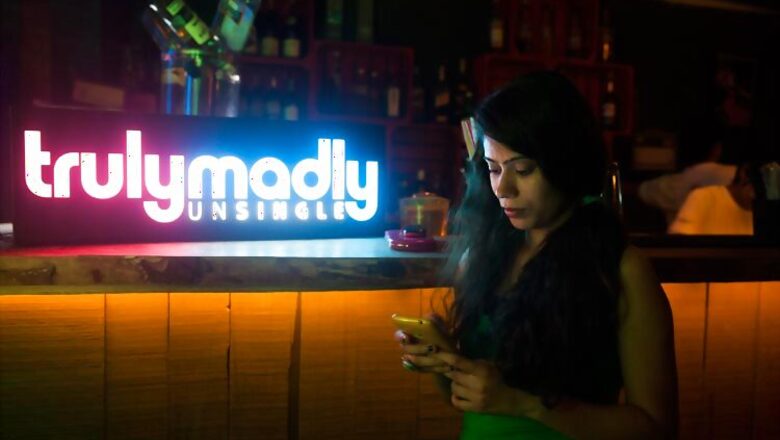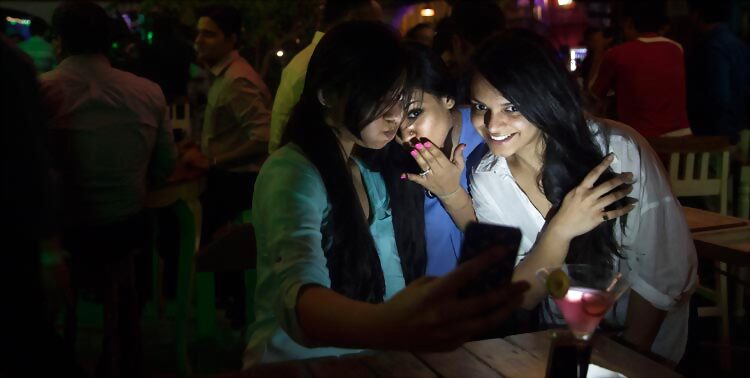
views
New Delhi: Aditi Mendiratta's biggest worry as she's swiping left and right is hiding the smartphone notifications that read "Congratulations! You have a new match" from her parents.
"They wouldn't be cool with it," the 20-year-old journalism student said, flipping her long black hair out of her face. "I'd probably be lectured a zillion times about how irresponsible I am."
Mendiratta is one of hundreds of thousands of young Indians nervously exploring online dating apps - and breaking with India's centuries-old traditions governing marriage and social conduct. The dating app market has exploded in recent years, with more than a dozen companies operating in India and more than a million smartphone users who have downloaded at least one of them.
The success of social dating apps may be somewhat surprising in India, where arranged marriage is still the norm and marrying outside of one's religious or ethnic community is often frowned upon. But youths raised during an era of economic growth and modernisation are eagerly embracing Western ideas, and increasingly willing to risk scandal to do so.
"In India, you need to have a reference to speak with anyone," Sagar Datta, a 24-year-old interior designer who has met at least 20 people, both men and women, he was introduced to through an app. "I never imagined strangers would be open to meeting strangers, just by looking at pictures of each other."
App developers are seizing on what they see as enormous potential in India, where half of the 1.2 billion population is younger than 25 and smartphone sales are projected to surge 67 per cent this year alone. Indian companies are coming up with home-grown dating apps to compete with imports like Los Angeles-based Tinder. They even have the quirky names down: Woo, Thrill, TrulyMadly, HitchUp and DesiCrush, to name a few.
But because dating is still widely seen as a social taboo in India, "it is very difficult to get girls in India to start using a dating app," said Sachin Bhatia, co-founder of India's TrulyMadly.
Success also requires navigating extra security concerns, developers said. India has been roiled in recent years by a series of high-profile cases of gang rape and violence against women, leading to front-page headlines and stricter laws on women's safety.
"We realised verification, security and privacy are very important" to women, Bhatia said. "That's what brings women to the app. They like to join an app where they can be sure that you will not have married men, stalkers or folks like that."

His company includes special features to reassure women the company has their best interests in mind. "Even a small incident will reflect badly on our app."
Developers said they were being particularly cautious after another app-based company, taxi service Uber, became embroiled in controversy in December and lost its license to operate in the Indian capital after one of its Delhi drivers was accused of raping a 26-year-old passenger.
Marketing to women means not just giving them more control over whom they connect with, but also carefully controlling which men are being featured and offering reassurance that the men are legitimate.
To do so, TrulyMadly encourages men to upload copies of their passports or other government-issued IDs, or to verify their phone numbers - all measures that might raise red flags over privacy in the West. It forbids risque photos, Bhatia said, and men who are married or post pictures of themselves smoking or holding a beer bottle are rejected outright. They'll even decide if a man looks desirable enough. If they're wearing an odd tank-top, or look thuggish, they're out. In total, a quarter of users who try to register on TrulyMadly are denied, Bhatia said.
Still, 65 per cent of its users are men.
The app Thrill sidelines up to 35 per cent of male users, without telling them, to a so-called "phantom zone" where they can still log on and view others' profiles, but can't make contact and are invisible to other users.
"It keeps out a lot of the riff-raff, to put it simply," said co-founder Josh Israel, a New Jersey native now living in New Delhi.
Whitney Wolfe, who co-founded Tinder before leaving to launch the app Bumble, said designing platforms that give women more control work in any country, not just India, where men traditionally take the lead.
"In the current landscape, women want to make the first move" but don't because they're afraid of what society will think, she said, explaining why Bumble allows only women to send a first message. The formula, she said, reduces the fear of rejection for men and removes the idea of a woman being "desperate."
Some young Indian women say they've been thrilled by the chance to chat with men they might not meet through family functions or in the office. Others relish the attention they receive.
"It just gives you so much control," said Anandita Malhotra, a 19-year-old student at an all-girl's college. "I'd be showered with compliments from 10 different guys every time I logged on. It made me feel extremely good about myself."
While Malhotra and many others may be dabbling in dating through the social apps, they're not all quite ready to give up on traditions like letting their parents chose their spouse.
"I want to have an arranged marriage," she said, flatly, adding that she recently told her mother, "'I don't trust my choice in men. So you will have to find me someone.'"















Comments
0 comment